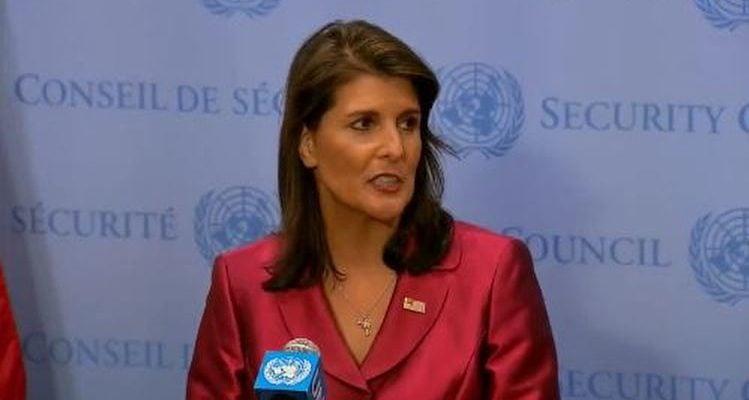“It is time we faced a hard truth — both sides would benefit greatly from a peace agreement, but the Palestinians would benefit more, and the Israelis would risk more,” Haley acknowledged.
By Barney Breen-Portnoy, The Algemeiner
The Israeli-Palestinian peace plan set to be unveiled by the Trump administration will “be different from all previous ones,” US Ambassador to the UN Nikki Haley said on Tuesday, in remarks delivered at her final appearance at the Security Council’s monthly meeting on the Middle East.
Haley, who will leave her post at the end of December following a nearly two-year stint at the UN, did not reveal specific details of the proposal — which she said she had read — or a roll-out timeline. Instead, speaking in generalities, she claimed the plan “embraces the reality that things can be done today that were previously unthinkable.”
“Unlike previous attempts at addressing this conflict, this plan is not just a few pages, containing unspecific and unimaginative guidelines,” Haley stated. “It is much longer. It contains much more thoughtful detail. It brings new elements to the discussion, taking advantage of the new world of technology that we live in. It recognizes the realities on the ground in the Middle East have changed — and changed in very powerful and important ways.”
“Israel is a thriving, strong, prosperous country,” she said. “It has always wanted peace with its neighbors. It has clearly demonstrated its willingness to make big sacrifices for peace, including giving up large areas of land. But Israel will not make a peace agreement at just any price, and it shouldn’t. No UN resolutions, antisemitic boycotts, or terrorist threats will ever change that. Throughout its existence, and even today, Israel has been surrounded by threats to its security. It would be foolish for it to make a deal that weakened its security. And yet, even in the face of constant threats, Israel has become one of the leading nations in the world. Israel wants a peace agreement, but it doesn’t need one.”
“And then there are the Palestinian people,” she continued. “Like the Israelis, they are a deservedly proud people. They too do not need to accept a peace agreement at any price. But the condition of the Palestinian people is very different. Economic opportunity, health care, even electricity are all scarce in the Palestinian territories. Terrorists rule much of the territory, undermining the safety of all civilians. The Palestinian people are suffering terribly while their leadership clings to 50-year-old demands that have only become less and less realistic. What awaits the Palestinian people with a peace agreement are the prospects of a massive improvement in the quality of their lives and far greater control over their political future.”
“It is time we faced a hard truth — both sides would benefit greatly from a peace agreement, but the Palestinians would benefit more, and the Israelis would risk more,” Haley asserted.
At the end of her speech, the 46-year-old former South Carolina governor — whose UN tenure has been marked by strong pro-Israel advocacy — said, “The world must know that America will remain steadfast in our support of Israel, its people, and its security. That is an unshakeable bond between our two peoples. And it is that bond — more than anything else — that makes peace possible.”





